Commercial and Corporation Law: Director Duties, Breach and Analysis
VerifiedAdded on 2020/05/08
|7
|1481
|198
Homework Assignment
AI Summary
This assignment provides a comprehensive analysis of director duties within the framework of commercial and corporation law, focusing on the responsibilities and potential breaches of these duties. It examines a case study involving Bond, the CEO of a company, who is alleged to have breached his director duties by failing to act with care and diligence, misusing company information, and potentially engaging in insider trading. The analysis references key sections of the Corporations Act 2001 and relevant case law, such as ASIC v Macdonald and ASIC v Stephen William Vizard, to support its arguments. The assignment also explores the breaches of Dr No, Mr Big, and Mr White. The document concludes that there was a breach of director duties on the part of all the directors. The analysis highlights the importance of adhering to legal and ethical standards to avoid potential liabilities. The assignment also references relevant legal cases and provides a conclusion on each part of the case study.

Paraphrase This Document
Need a fresh take? Get an instant paraphrase of this document with our AI Paraphraser
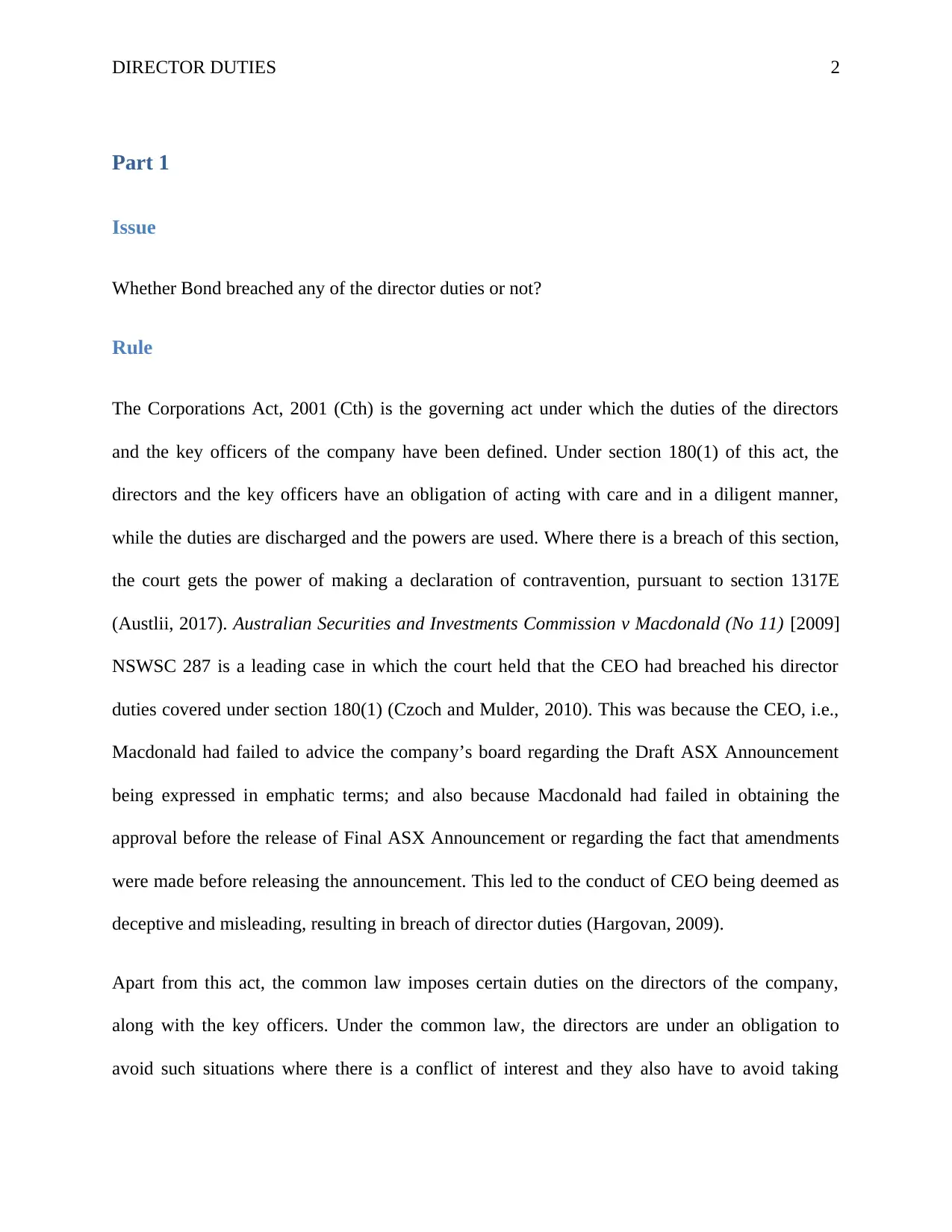
DIRECTOR DUTIES 2
Part 1
Issue
Whether Bond breached any of the director duties or not?
Rule
The Corporations Act, 2001 (Cth) is the governing act under which the duties of the directors
and the key officers of the company have been defined. Under section 180(1) of this act, the
directors and the key officers have an obligation of acting with care and in a diligent manner,
while the duties are discharged and the powers are used. Where there is a breach of this section,
the court gets the power of making a declaration of contravention, pursuant to section 1317E
(Austlii, 2017). Australian Securities and Investments Commission v Macdonald (No 11) [2009]
NSWSC 287 is a leading case in which the court held that the CEO had breached his director
duties covered under section 180(1) (Czoch and Mulder, 2010). This was because the CEO, i.e.,
Macdonald had failed to advice the company’s board regarding the Draft ASX Announcement
being expressed in emphatic terms; and also because Macdonald had failed in obtaining the
approval before the release of Final ASX Announcement or regarding the fact that amendments
were made before releasing the announcement. This led to the conduct of CEO being deemed as
deceptive and misleading, resulting in breach of director duties (Hargovan, 2009).
Apart from this act, the common law imposes certain duties on the directors of the company,
along with the key officers. Under the common law, the directors are under an obligation to
avoid such situations where there is a conflict of interest and they also have to avoid taking
Part 1
Issue
Whether Bond breached any of the director duties or not?
Rule
The Corporations Act, 2001 (Cth) is the governing act under which the duties of the directors
and the key officers of the company have been defined. Under section 180(1) of this act, the
directors and the key officers have an obligation of acting with care and in a diligent manner,
while the duties are discharged and the powers are used. Where there is a breach of this section,
the court gets the power of making a declaration of contravention, pursuant to section 1317E
(Austlii, 2017). Australian Securities and Investments Commission v Macdonald (No 11) [2009]
NSWSC 287 is a leading case in which the court held that the CEO had breached his director
duties covered under section 180(1) (Czoch and Mulder, 2010). This was because the CEO, i.e.,
Macdonald had failed to advice the company’s board regarding the Draft ASX Announcement
being expressed in emphatic terms; and also because Macdonald had failed in obtaining the
approval before the release of Final ASX Announcement or regarding the fact that amendments
were made before releasing the announcement. This led to the conduct of CEO being deemed as
deceptive and misleading, resulting in breach of director duties (Hargovan, 2009).
Apart from this act, the common law imposes certain duties on the directors of the company,
along with the key officers. Under the common law, the directors are under an obligation to
avoid such situations where there is a conflict of interest and they also have to avoid taking
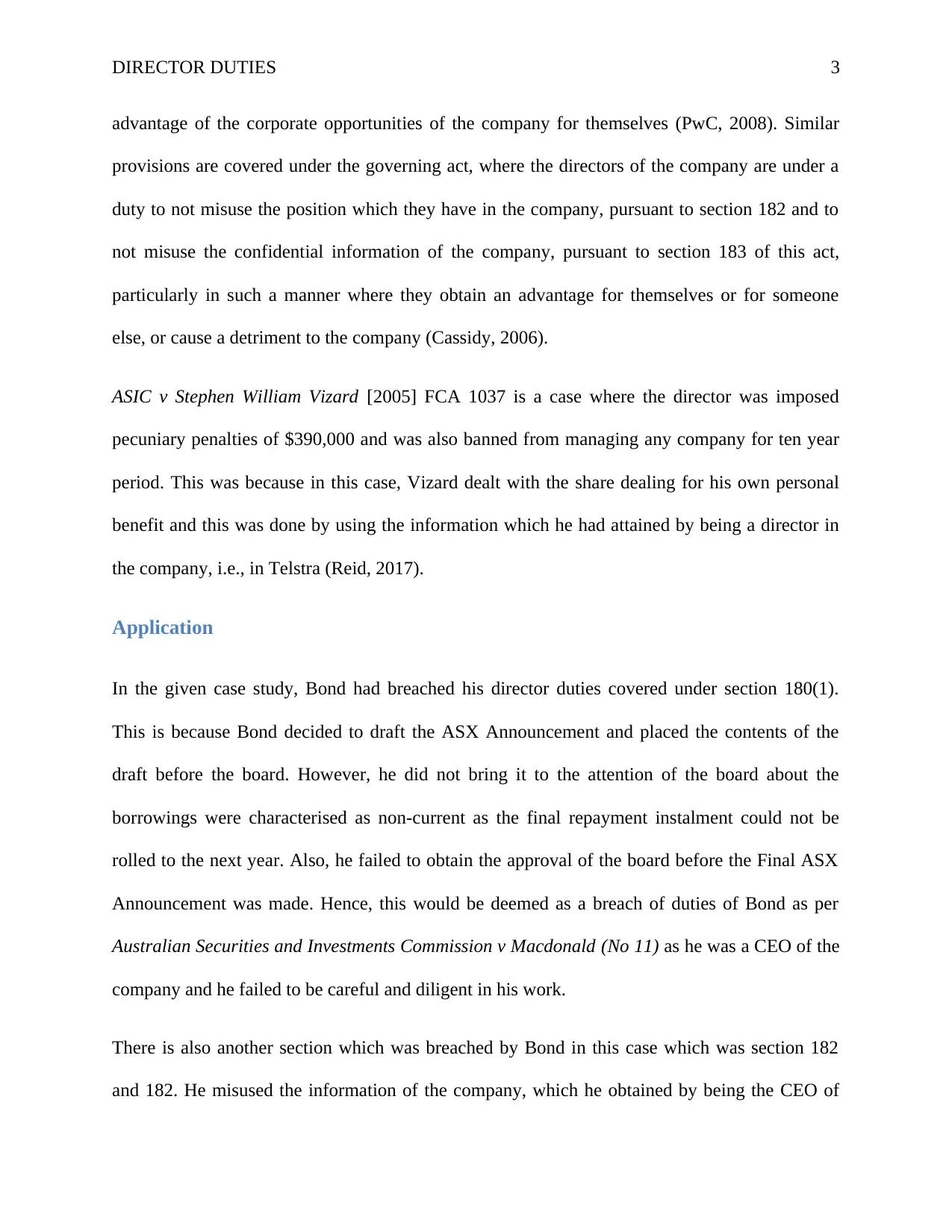
DIRECTOR DUTIES 3
advantage of the corporate opportunities of the company for themselves (PwC, 2008). Similar
provisions are covered under the governing act, where the directors of the company are under a
duty to not misuse the position which they have in the company, pursuant to section 182 and to
not misuse the confidential information of the company, pursuant to section 183 of this act,
particularly in such a manner where they obtain an advantage for themselves or for someone
else, or cause a detriment to the company (Cassidy, 2006).
ASIC v Stephen William Vizard [2005] FCA 1037 is a case where the director was imposed
pecuniary penalties of $390,000 and was also banned from managing any company for ten year
period. This was because in this case, Vizard dealt with the share dealing for his own personal
benefit and this was done by using the information which he had attained by being a director in
the company, i.e., in Telstra (Reid, 2017).
Application
In the given case study, Bond had breached his director duties covered under section 180(1).
This is because Bond decided to draft the ASX Announcement and placed the contents of the
draft before the board. However, he did not bring it to the attention of the board about the
borrowings were characterised as non-current as the final repayment instalment could not be
rolled to the next year. Also, he failed to obtain the approval of the board before the Final ASX
Announcement was made. Hence, this would be deemed as a breach of duties of Bond as per
Australian Securities and Investments Commission v Macdonald (No 11) as he was a CEO of the
company and he failed to be careful and diligent in his work.
There is also another section which was breached by Bond in this case which was section 182
and 182. He misused the information of the company, which he obtained by being the CEO of
advantage of the corporate opportunities of the company for themselves (PwC, 2008). Similar
provisions are covered under the governing act, where the directors of the company are under a
duty to not misuse the position which they have in the company, pursuant to section 182 and to
not misuse the confidential information of the company, pursuant to section 183 of this act,
particularly in such a manner where they obtain an advantage for themselves or for someone
else, or cause a detriment to the company (Cassidy, 2006).
ASIC v Stephen William Vizard [2005] FCA 1037 is a case where the director was imposed
pecuniary penalties of $390,000 and was also banned from managing any company for ten year
period. This was because in this case, Vizard dealt with the share dealing for his own personal
benefit and this was done by using the information which he had attained by being a director in
the company, i.e., in Telstra (Reid, 2017).
Application
In the given case study, Bond had breached his director duties covered under section 180(1).
This is because Bond decided to draft the ASX Announcement and placed the contents of the
draft before the board. However, he did not bring it to the attention of the board about the
borrowings were characterised as non-current as the final repayment instalment could not be
rolled to the next year. Also, he failed to obtain the approval of the board before the Final ASX
Announcement was made. Hence, this would be deemed as a breach of duties of Bond as per
Australian Securities and Investments Commission v Macdonald (No 11) as he was a CEO of the
company and he failed to be careful and diligent in his work.
There is also another section which was breached by Bond in this case which was section 182
and 182. He misused the information of the company, which he obtained by being the CEO of
⊘ This is a preview!⊘
Do you want full access?
Subscribe today to unlock all pages.

Trusted by 1+ million students worldwide
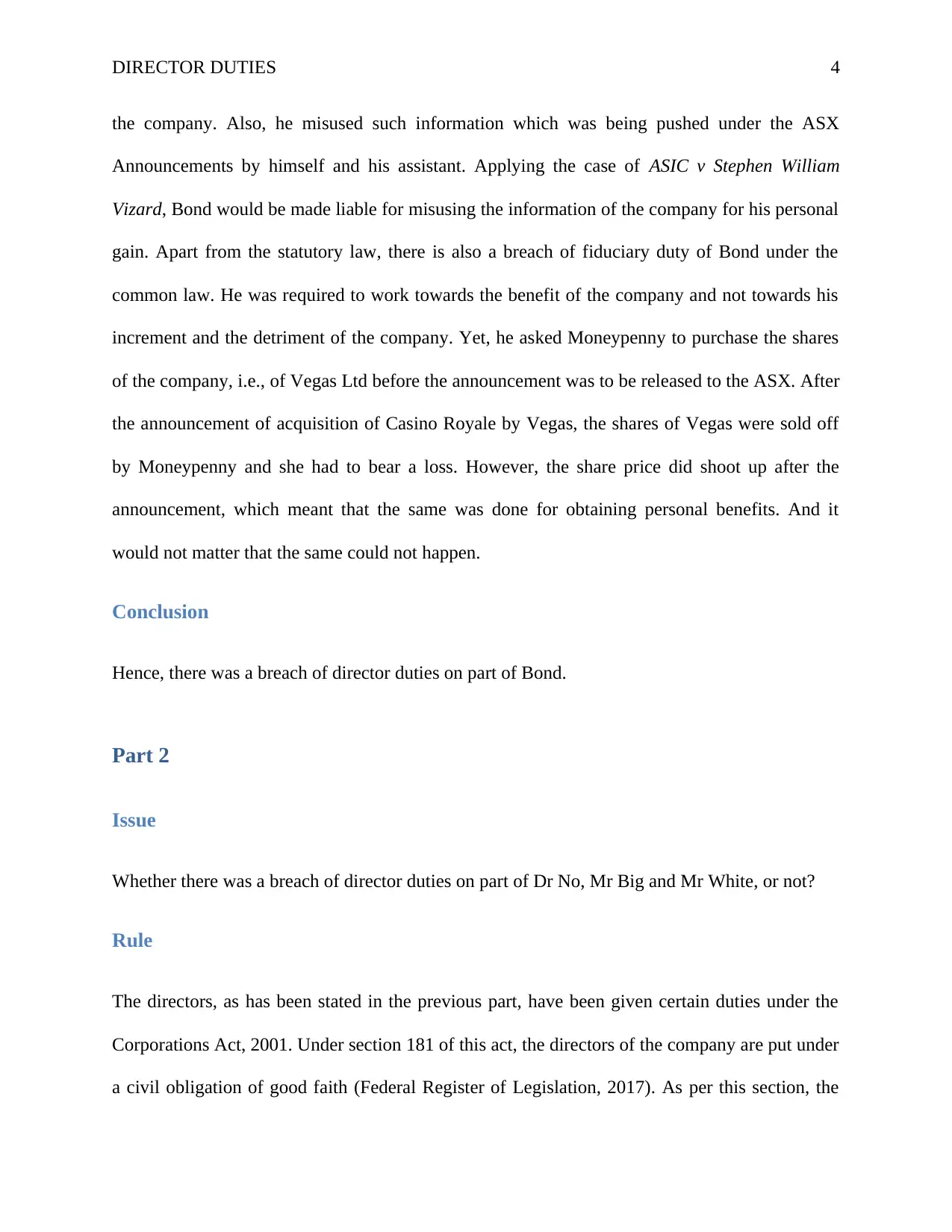
DIRECTOR DUTIES 4
the company. Also, he misused such information which was being pushed under the ASX
Announcements by himself and his assistant. Applying the case of ASIC v Stephen William
Vizard, Bond would be made liable for misusing the information of the company for his personal
gain. Apart from the statutory law, there is also a breach of fiduciary duty of Bond under the
common law. He was required to work towards the benefit of the company and not towards his
increment and the detriment of the company. Yet, he asked Moneypenny to purchase the shares
of the company, i.e., of Vegas Ltd before the announcement was to be released to the ASX. After
the announcement of acquisition of Casino Royale by Vegas, the shares of Vegas were sold off
by Moneypenny and she had to bear a loss. However, the share price did shoot up after the
announcement, which meant that the same was done for obtaining personal benefits. And it
would not matter that the same could not happen.
Conclusion
Hence, there was a breach of director duties on part of Bond.
Part 2
Issue
Whether there was a breach of director duties on part of Dr No, Mr Big and Mr White, or not?
Rule
The directors, as has been stated in the previous part, have been given certain duties under the
Corporations Act, 2001. Under section 181 of this act, the directors of the company are put under
a civil obligation of good faith (Federal Register of Legislation, 2017). As per this section, the
the company. Also, he misused such information which was being pushed under the ASX
Announcements by himself and his assistant. Applying the case of ASIC v Stephen William
Vizard, Bond would be made liable for misusing the information of the company for his personal
gain. Apart from the statutory law, there is also a breach of fiduciary duty of Bond under the
common law. He was required to work towards the benefit of the company and not towards his
increment and the detriment of the company. Yet, he asked Moneypenny to purchase the shares
of the company, i.e., of Vegas Ltd before the announcement was to be released to the ASX. After
the announcement of acquisition of Casino Royale by Vegas, the shares of Vegas were sold off
by Moneypenny and she had to bear a loss. However, the share price did shoot up after the
announcement, which meant that the same was done for obtaining personal benefits. And it
would not matter that the same could not happen.
Conclusion
Hence, there was a breach of director duties on part of Bond.
Part 2
Issue
Whether there was a breach of director duties on part of Dr No, Mr Big and Mr White, or not?
Rule
The directors, as has been stated in the previous part, have been given certain duties under the
Corporations Act, 2001. Under section 181 of this act, the directors of the company are put under
a civil obligation of good faith (Federal Register of Legislation, 2017). As per this section, the
Paraphrase This Document
Need a fresh take? Get an instant paraphrase of this document with our AI Paraphraser
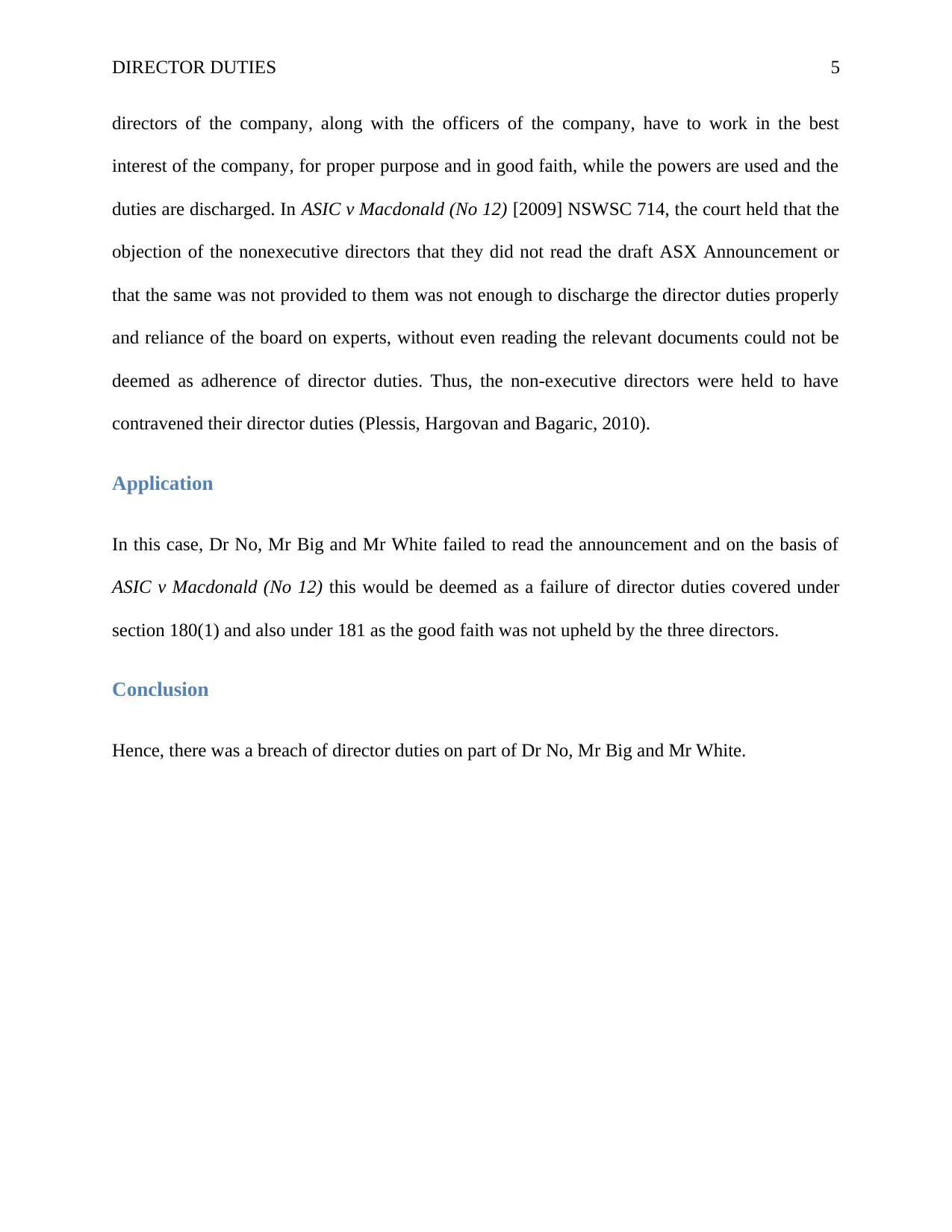
DIRECTOR DUTIES 5
directors of the company, along with the officers of the company, have to work in the best
interest of the company, for proper purpose and in good faith, while the powers are used and the
duties are discharged. In ASIC v Macdonald (No 12) [2009] NSWSC 714, the court held that the
objection of the nonexecutive directors that they did not read the draft ASX Announcement or
that the same was not provided to them was not enough to discharge the director duties properly
and reliance of the board on experts, without even reading the relevant documents could not be
deemed as adherence of director duties. Thus, the non-executive directors were held to have
contravened their director duties (Plessis, Hargovan and Bagaric, 2010).
Application
In this case, Dr No, Mr Big and Mr White failed to read the announcement and on the basis of
ASIC v Macdonald (No 12) this would be deemed as a failure of director duties covered under
section 180(1) and also under 181 as the good faith was not upheld by the three directors.
Conclusion
Hence, there was a breach of director duties on part of Dr No, Mr Big and Mr White.
directors of the company, along with the officers of the company, have to work in the best
interest of the company, for proper purpose and in good faith, while the powers are used and the
duties are discharged. In ASIC v Macdonald (No 12) [2009] NSWSC 714, the court held that the
objection of the nonexecutive directors that they did not read the draft ASX Announcement or
that the same was not provided to them was not enough to discharge the director duties properly
and reliance of the board on experts, without even reading the relevant documents could not be
deemed as adherence of director duties. Thus, the non-executive directors were held to have
contravened their director duties (Plessis, Hargovan and Bagaric, 2010).
Application
In this case, Dr No, Mr Big and Mr White failed to read the announcement and on the basis of
ASIC v Macdonald (No 12) this would be deemed as a failure of director duties covered under
section 180(1) and also under 181 as the good faith was not upheld by the three directors.
Conclusion
Hence, there was a breach of director duties on part of Dr No, Mr Big and Mr White.
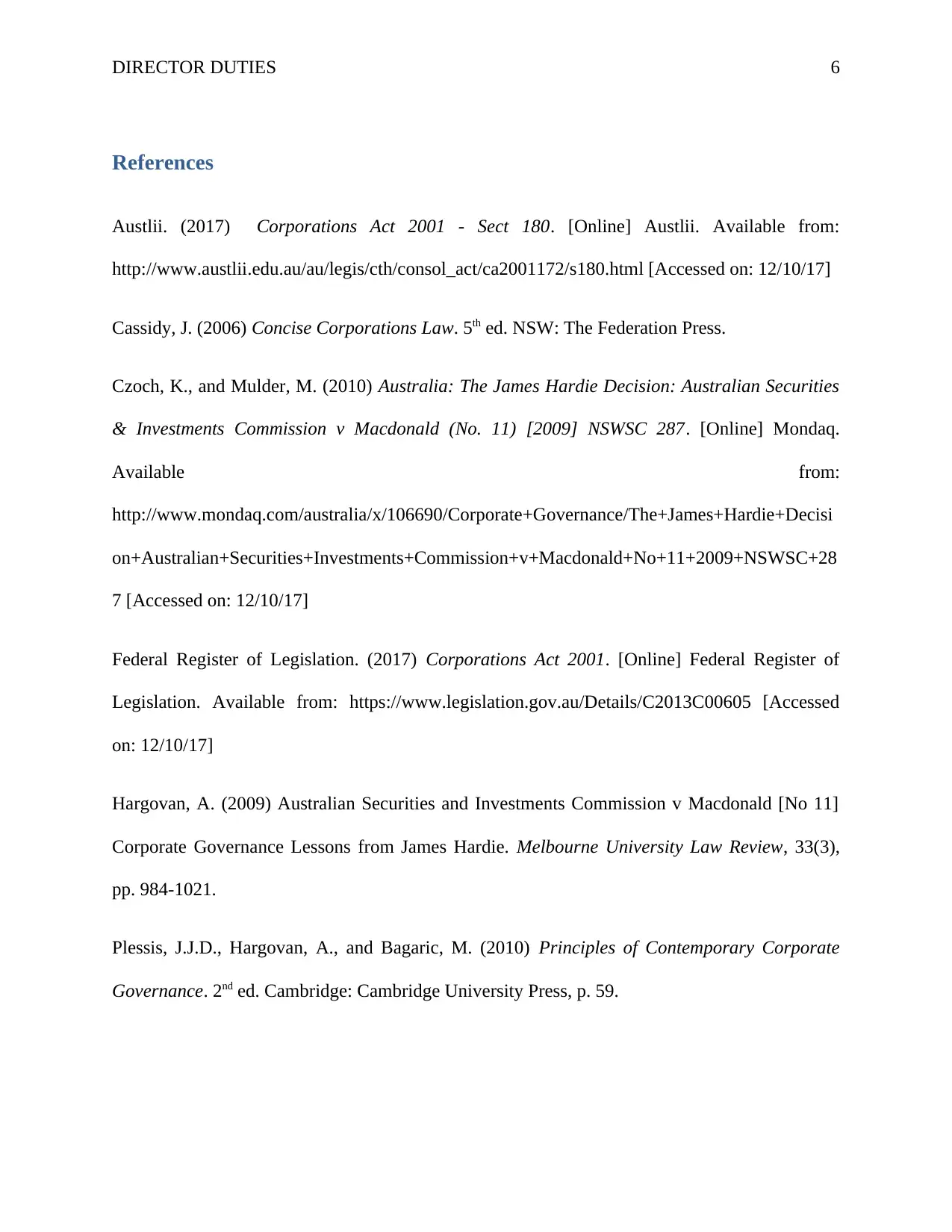
DIRECTOR DUTIES 6
References
Austlii. (2017) Corporations Act 2001 - Sect 180. [Online] Austlii. Available from:
http://www.austlii.edu.au/au/legis/cth/consol_act/ca2001172/s180.html [Accessed on: 12/10/17]
Cassidy, J. (2006) Concise Corporations Law. 5th ed. NSW: The Federation Press.
Czoch, K., and Mulder, M. (2010) Australia: The James Hardie Decision: Australian Securities
& Investments Commission v Macdonald (No. 11) [2009] NSWSC 287. [Online] Mondaq.
Available from:
http://www.mondaq.com/australia/x/106690/Corporate+Governance/The+James+Hardie+Decisi
on+Australian+Securities+Investments+Commission+v+Macdonald+No+11+2009+NSWSC+28
7 [Accessed on: 12/10/17]
Federal Register of Legislation. (2017) Corporations Act 2001. [Online] Federal Register of
Legislation. Available from: https://www.legislation.gov.au/Details/C2013C00605 [Accessed
on: 12/10/17]
Hargovan, A. (2009) Australian Securities and Investments Commission v Macdonald [No 11]
Corporate Governance Lessons from James Hardie. Melbourne University Law Review, 33(3),
pp. 984-1021.
Plessis, J.J.D., Hargovan, A., and Bagaric, M. (2010) Principles of Contemporary Corporate
Governance. 2nd ed. Cambridge: Cambridge University Press, p. 59.
References
Austlii. (2017) Corporations Act 2001 - Sect 180. [Online] Austlii. Available from:
http://www.austlii.edu.au/au/legis/cth/consol_act/ca2001172/s180.html [Accessed on: 12/10/17]
Cassidy, J. (2006) Concise Corporations Law. 5th ed. NSW: The Federation Press.
Czoch, K., and Mulder, M. (2010) Australia: The James Hardie Decision: Australian Securities
& Investments Commission v Macdonald (No. 11) [2009] NSWSC 287. [Online] Mondaq.
Available from:
http://www.mondaq.com/australia/x/106690/Corporate+Governance/The+James+Hardie+Decisi
on+Australian+Securities+Investments+Commission+v+Macdonald+No+11+2009+NSWSC+28
7 [Accessed on: 12/10/17]
Federal Register of Legislation. (2017) Corporations Act 2001. [Online] Federal Register of
Legislation. Available from: https://www.legislation.gov.au/Details/C2013C00605 [Accessed
on: 12/10/17]
Hargovan, A. (2009) Australian Securities and Investments Commission v Macdonald [No 11]
Corporate Governance Lessons from James Hardie. Melbourne University Law Review, 33(3),
pp. 984-1021.
Plessis, J.J.D., Hargovan, A., and Bagaric, M. (2010) Principles of Contemporary Corporate
Governance. 2nd ed. Cambridge: Cambridge University Press, p. 59.
⊘ This is a preview!⊘
Do you want full access?
Subscribe today to unlock all pages.

Trusted by 1+ million students worldwide
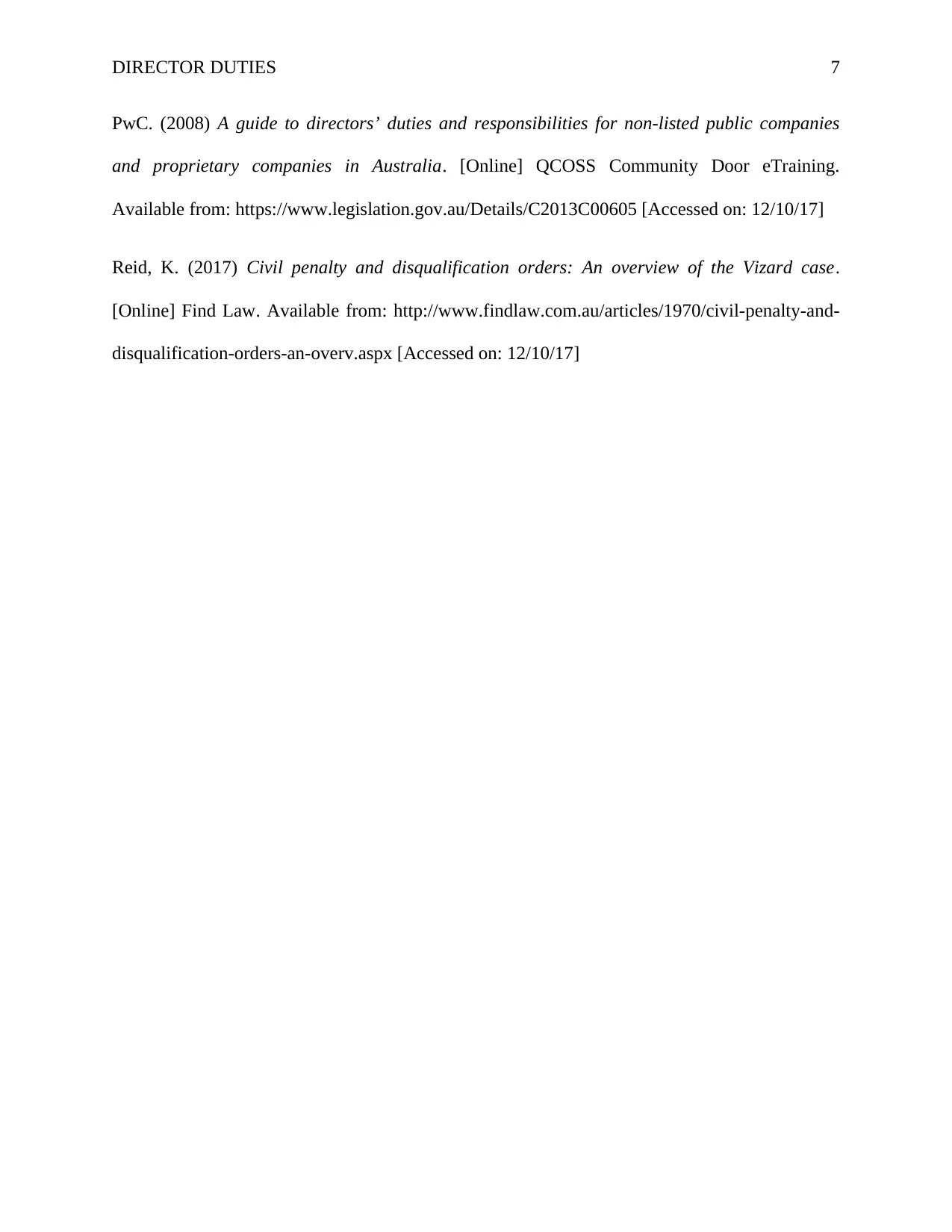
DIRECTOR DUTIES 7
PwC. (2008) A guide to directors’ duties and responsibilities for non-listed public companies
and proprietary companies in Australia. [Online] QCOSS Community Door eTraining.
Available from: https://www.legislation.gov.au/Details/C2013C00605 [Accessed on: 12/10/17]
Reid, K. (2017) Civil penalty and disqualification orders: An overview of the Vizard case.
[Online] Find Law. Available from: http://www.findlaw.com.au/articles/1970/civil-penalty-and-
disqualification-orders-an-overv.aspx [Accessed on: 12/10/17]
PwC. (2008) A guide to directors’ duties and responsibilities for non-listed public companies
and proprietary companies in Australia. [Online] QCOSS Community Door eTraining.
Available from: https://www.legislation.gov.au/Details/C2013C00605 [Accessed on: 12/10/17]
Reid, K. (2017) Civil penalty and disqualification orders: An overview of the Vizard case.
[Online] Find Law. Available from: http://www.findlaw.com.au/articles/1970/civil-penalty-and-
disqualification-orders-an-overv.aspx [Accessed on: 12/10/17]
1 out of 7
Related Documents
Your All-in-One AI-Powered Toolkit for Academic Success.
+13062052269
info@desklib.com
Available 24*7 on WhatsApp / Email
![[object Object]](/_next/static/media/star-bottom.7253800d.svg)
Unlock your academic potential
Copyright © 2020–2026 A2Z Services. All Rights Reserved. Developed and managed by ZUCOL.



![Detailed Case Study: ASIC v Narain [2008] FCAFC 120 - Corporations Law](/_next/image/?url=https%3A%2F%2Fdesklib.com%2Fmedia%2Fimages%2Fjp%2Fef194f4833aa4344888c1630d12f41be.jpg&w=256&q=75)

